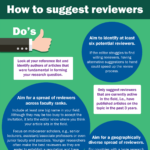“I have been invited to submit to a journal. How do I know it’s a good journal?” This question was asked in the Q&A session of an online talk presented by International Science Editing. In this blog, we discuss why you should be wary of email invitations to submit original research articles, how to assess […]
How to suggest reviewers
Journals often struggle to find willing reviewers, which can lengthen the publication process. To combat this, you may be requested to suggest reviewers at the submission stage. In the following infographic, we provide some tips on identifying suitable reviewers. The infographic contains the following text: Do’s Aim to identify at least six potential reviewers. […]
Streamline the publication process with a presubmission enquiry
Before formally submitting to a journal, you can contact the editor describing what you would like to get published. This is known as a presubmission enquiry. If appropriate and presented correctly, a presubmission enquiry will allow the editor to quickly assess if a formal submission is worth your time. Some journals (e.g., The Journal of […]
Steer the future of science: publish your negative results
Publication bias and reproducibility are two of the key challenges facing the future of science. While certain initiatives have been implemented—for example, the International Committee of Medical Journal Editors (ICMJE) requires clinical trials to be pre-registered in a public registry database from the start—we shouldn’t rely on such incentives to drive change. It is only […]





